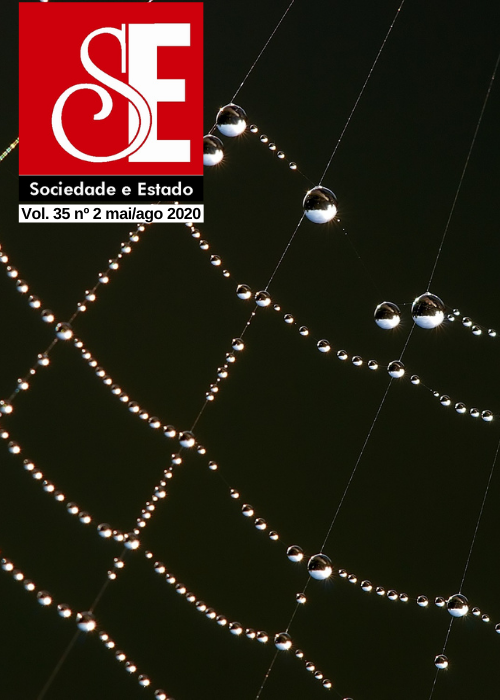The powers of private security in policing private properties for collective use
DOI:
https://doi.org/10.1590/s0102-6992-202035020002Keywords:
Policing, private security, mass private property, legal powers, abusesAbstract
The second half of the twentieth century witnessed a major change in the organization of urban space and formal social control. An important part of social interactions that had previously occurred in public spaces policed by the police moved to mass private properties policed by private security forces. Faced with this reality, this paper analyzes the foundations and limits of some legal powers used in policing of mass private properties’ users: the deny from entries, the ejections and the searches. The research is based on the empirical study of state norms and on the quantitative and qualitative analysis of 216 cases judged by the Tribunal de Justiça de São Paulo and the Tribunal de Justiça do Paraná related to the use of these powers. The results show that the security guards in mass private properties have broader powers than police officers in public spaces. The consequences of this finding are discussed.
Downloads
References
BAYLEY, D.; SHEARING, C. The new structure of policing: description, conceptualization, and research agenda series. Research Report, 2001. [ Links ]
BUTTON, M. Security officers and policing: powers, culture and control in the governance of private space. Aldershot (UK); Burlington (NJ): Ashgate Publishing, Ltd., 2007. [ Links ]
CALDEIRA, T. P. Cidade de muros: crime, segregação e cidadania em São Paulo. 2. ed. São Paulo: Editora 34; Edusp, 2003. [ Links ]
CRAWFORD, A. Policing and security as “club goods”: the new enclosures? In: WOOD, J.; DUPONT, B. (Eds.). Democracy, society and the governance of security, p. 111-138. New York: Cambridge University Press, 2006. [ Links ]
GRAY, K.; GRAY, S. F. Civil rights, civil wrongs, and quasi-public space. European Human Rights Law Review, p. 1-59, 1999. [ Links ]
HIRSCH, A. VON; SHEARING, C. D. Exclusion from public space. In: HIRSCH, A. V.; GARLAND, D.; WAKEFIELD, A. (Eds.). Ethical and social perspectives on situational crime prevention, p. 241. Oxford (UK): Hart Publishing, 2000. [ Links ]
JOHNSTON, L.; SHEARING, C. D. Governing security: explorations in policing and justice. London: Routledge, 2003. [ Links ]
KEMPA, M.; STENNING, P.; WOOD, J. Policing communal spaces. A reconfiguration of the “mass private property” hypothesis. British Journal of Criminology, v. 44, n. 4, p. 562-581, 7 Jan. 2004. [ Links ]
KEMPA, M. et alii. Reflections of the evolving concept of “private policing”. European Journal on Criminal Policy and Research, v. 7, n. 2, p. 197-223, 1999. [ Links ]
LIBERTY. Liberty’s supplementary evidence to the Joint Committee on Human Rights: “policing and protest” - private property. Londres: National Council for Civil Liberties, 2008. Disponível em: <https://www.libertyhumanrights.org.uk/sites/default/files/supplementary-evidence-to-jchr-protest-and-private-land-.pdf>. [ Links ]
LOPES, C. da S. As ferramentas legais universais da segurança privada: Um estudo sobre os direitos de questionar, usar força física e prender dos seguranças particulares brasileiros. Dilemas - Revista de Estudos de Conflito e Controle Social, v. 11, n. 1, p. 97-126, Maio 2018. [ Links ]
_____. O setor de segurança privada da região metropolitana de São Paulo: crescimento, dimensões. Caderno CRH, v. 26, n. 69, p. 599-617, Dez. 2013. [ Links ]
MARSHALL, T. H. Cidadania, classes sociais e status. Rio de Janeiro: Zahar, 1967. [ Links ]
Sujeição criminal MISSE, M. . In: LIMA, R. S. D.; RATTON, J. L.; AZEVEDO, R. G. de A. (Eds.). Crime, polícia e justiça no Brasil. São Paulo: Contexto, 2014. [ Links ]
MUNIZ, J. O.; PAES-MACHADO, E. Polícia para quem precisa de polícia: contribuições aos estudos sobre policiamento. Caderno CRH, v. 23, n. 60, p. 437-447, 2010. [ Links ]
MUSUMECI, L. Serviços privados de vigilância e guarda no Brasil: um estudo a partir de informações da Pnad - 1985-1995. Diagnóstico do setor serviços no Brasil. Rio de Janeiro: MICT/Ipea/Anpec, 1998. [ Links ]
PAIXÃO, A. L. Segurança privada, direitos humanos e democracia: notas preliminares sobre novos dilemas políticos. Novos Estudos Cebrap, v. 31, p. 131-141, 1991. [ Links ]
RIGAKOS, G. S.; GREENER, D. R. Bubbles of governance: private policing and the law in Canada. Canadian Journal of Law and Society / La Revue Canadienne Droit et Société, v. 15, n. 1, p. 145-185, Abr. 2000. [ Links ]
RODRIGUES, R.; RIBEIRO, E.; CANO, I. A privatização da segurança no Brasil e no Rio de Janeiro: tamanho, evolução e precarização da segurança privada. Trabalho completo apresentado no Simpósio Mercados de Proteção e Governança da Segurança. Londrina, 2019. Disponível em: <http://www2.uel.br/laboratorios/legs/wp-content/uploads/2019/06/GT1_RobsonRodrigues.pdf>. [ Links ]
SARRE, R. Legal sources of private security powers. Canberra Law Review, v. 7, p. 109, 2003. [ Links ]
SHEARING, C. D. A relação entre policiamento público e policiamento privado. In: TONRY, M.; MORRIS, N. (Eds.). Policiamento moderno, p. 427-462. São Paulo: Edusp, 2003. [ Links ]
SHEARING, C. D.; STENNING, P. C. Private security: implications for social control. Social problems, p. 493-506, 1983. [ Links ]
_____. Modern private security: its growth and implications. Crime and Justice, v. 3, p. 193-245, Jan. 1981. [ Links ]
SHEARING, C.; WOOD, J. Nodal governance, democracy, and the new “denizens”. Journal of Law and Society, v. 30, n. 3, p. 400-419, 2003. [ Links ]
SILVA LOPES, C.da. A. Policing labor: the power of private security guards to search workers in Brazil. Crime, Law and Social Change, v. 70, n. 5, p. 583-602, Dez. 2018. [ Links ]
STENNING, P. C. Powers and accountability of private police. European Journal on Criminal Policy and Research, v. 8, n. 3, p. 325-352, Set. 2000. [ Links ]
STENNING, P. C.; SHEARING, C. D. Search and seizure - powers of private security personnel. Canada: Law Reform Commission of Canada, 1979. [ Links ]
WAKEFIELD, A. Selling security. London; New York: Routledge, 2003. [ Links ]
ZANETIC, A. Policiamento e segurança privada: duas notas conceituais. Estudos de Sociologia, v. 17, n. 33, 2012. [ Links ]




.jpg)



















